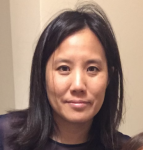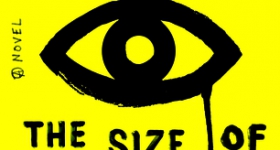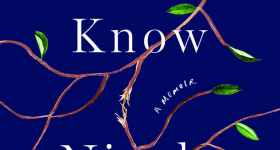On a balmy afternoon in San Francisco, I Zoomed with author and professor May-Lee Chai, whose short story collection, Tomorrow in Shanghai and Other Stories, was just published in August. Chai’s collection takes readers to a new Shanghai outside Earth; contemplates the modern complications of two women who fall in love in China despite the odds; and bears witness to a Chinese immigrant boy’s first moments in America.
Chai’s characters find and lose their dreams, which are often vulnerable, diaphanous and fragile, pitted against a hard reality. In the second story, a young immigrant boy is rescued by a cook from the full force of gang brutality, then befriended by a boy who saves him from drowning. In quiet moments the boy ponders how to describe his American life to his parents in China. Inspired by Bill Clinton’s speech about life on Mars, he decides to write about Mars and tattoo his ankle with the red planet. In another story, a nanny travels to space for her job. Chai deftly conveys the inequity of care work, detailing the nanny’s financial pressures to send money back home to Earth, all the while offering fascinating extrapolations about the AI and robots of the future.
Chai says, “I love short stories as a form and I teach them and read them. Readers ask me how to read them and, like watching a series on Netflix, you can binge read them all at once or read them individually.” Because of streaming subscriptions she is wondering if this conceptual connection with the short story format will hail a new renaissance for the form.
While the collection showcases her creative imagination, Chai began her writing career as a journalist. Her first job out of college was with the Associated Press. At the time, she was disturbed by anti-Asian racism triggered by the rise of the Japanese auto industry. She remembers visuals from that time, including “a magazine with the Statue of Liberty remade as a geisha and an image of a sumo wrestler straddling Rockefeller Center,” as well as lampoons targeting Japanese real estate acquisitions. Relatedly, she recalls traumatic memories of Vincent Chin’s murder at the hands of bitter auto workers. Chai was no stranger to racism in her formative years. After being born in Southern California and living in the New York metropolitan area, at 12 she moved to rural South Dakota for her father’s job. “And that was hell,” Chai says emphatically. “We were there for the 1980s and faced a lot of violence from the white community there who resented our presence.”
Reflecting on her parents, Chai says, “My father is Chinese and my mother is white, and [the community in South Dakota] didn’t like mixed marriages. I think in particular because it was a Chinese man married to a white woman. If it had been a white man I think they would have reacted differently.” She recounts how “white people would come by and shoot at our house and kill our dogs and leave them in the driveway. We also got a lot of hate mail.” People would approach her family and shout racial slurs. Chai’s family tried to move after the first year but they couldn’t sell their home; prospective buyers would find their loan applications mysteriously denied. Their home was finally purchased in cash by someone who had won the Iowa state lottery. Nine years had passed by then.
As soon as she turned 18, Chai left the midwest and moved nomadically. She credits her experiences wandering as motivating her to become a writer. Pieces of that experience find their way into the story “Hong’s Mother.” One of the first places she went was China for a family reunion in 1985. It was the first time her father had returned since he was 16. On the trip an uncle of hers described surviving the Cultural Revolution. In front of his old house in Nanjing, Chai says her father had a meltdown and started shouting, “The communists have ruined everything; everyone is poor!” Chai later attended Nanjing University and later returned to the city on a fellowship to teach English at a local school. She was later accepted into a university’s doctoral program in Chinese history but soon decided to pursue creative writing instead. A cancer scare in her early 20s made her realize that she should follow her dream to write rather than wait or enter a program that could not accommodate her health concerns at the time.
Chai has combated racism for many years of her life, and her stories reflect an engagement of the topic with a profoundly thoughtful and often gentle lens. Her characters sense that the world is wayward but do not succumb to bitterness. Rather, they display incredible inner strength. In “The Monkey King of Sichuan,” two former grad students muse about the chair of their department who preys on Chinese graduate students. In “White Rabbits,” a college student remembers with fondness a time when she, at 6, got lost with her grandfather, who hesitates to ask an older white man for directions. Chai says that her stories are inspired by things in the present but set in different time periods. “It was unbearable to write about them in the present. Things have been so intense with Trump, the pandemic and Asian American violence that I had to mentally be in a different time period.”
Despite these dangers, Chai is excited about the progress of Asian Americans in the arts: “We have so many community building things going on, making us more visible.” She is especially excited about the film Everything Everywhere All At Once, which appealed to many people across diverse communities. “It’s very specific to a Chinese American immigrant family. But now it doesn’t work to put in just the Asian sidekick in a Marvel movie or have the Asian woman sex worker get rescued, and it took another generation of Asian American creatives to produce new stories.” She continues, “Michelle Yeoh has been working for decades as an international star and had the talent to carry this movie. And [the film’s co-star] Ke Huy Quan said he didn’t want to work in Hollywood for decades until this role came up. Let's hope we can keep building and never go back.”
Chai’s optimism and appreciation for the progress Asian Americans have made was infectious. It inspired me that such a generous heart was teaching others to fulfill their dreams in a classroom. “So many of us don’t see our stories reflected; we’re not in the canon. It may not be something we’ve seen at school or in the mainstream media. And as someone who was once in that place, I’d say, dare to write.”










Comments